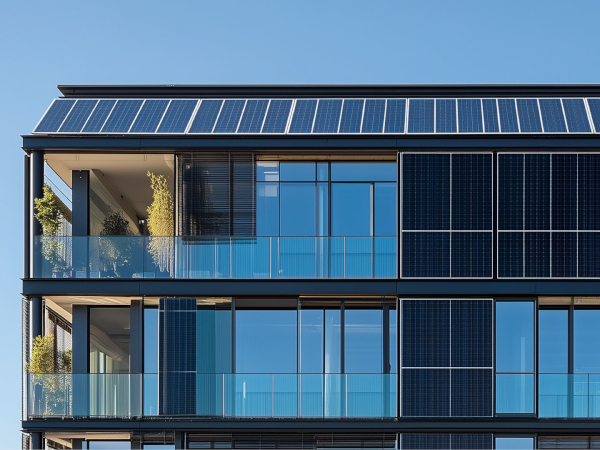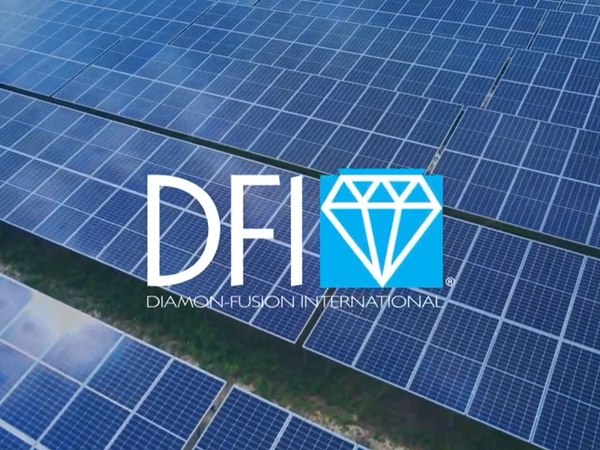Date: 14 January 2010
The two British firms have delivered a ground-breaking, fully integrated renewable electricity generation facility within a new urban streetscape in Washington DC.Designed by ZGF Architects, the innovative redevelopment project in the neighbourhood of Columbia Heights features a prominent new pedestrian plaza which includes a series of ornamental glass canopies that incorporate photovoltaic (PV) modules.Called the Civic Plaza, this is one of the first urban streetscapes of its kind in the world to have its own renewable electricity generation capability and it could be a model for future low carbon town and city public realm architecture here in the UK.The electricity-generating canopies are designed to resemble sculptured flowers within a largely hardscaped triangular-shaped public space at a major road junction. They were constructed by attaching a series of pre-drilled rectangular and radiused laminated glass panels, which incorporate PV cells, to a brushed stainless steel tubular framework using SFS intec’s spider and point fixings.The renewable electricity generation capability of the canopies is delivered using Vidursolar photovoltaic modules, which are part of Telling Architectural’s Building Integrated Photovoltaic (BIPV) solutions. The BIPV units at Columbia Heights are created using laminated safety glass with PVB as the interlayer and comply fully with safety standards for glazing in public areas.It is estimated that the six PV units will produce about 3,600 kWh/year based on solar radiation data via Meteonorm for Washington DC. The total installed PV power is 3.090 Wp (515 Wp per unit).SFS intec’s spider fittings attach the PV modules to the steel framework. Single, double and 4-arm stainless steel spiders were used in combination with ALP 45 dia raised point fixings. These precision engineered stainless steel fittings ensure long term structural reliability, even with extreme wind and snow loadings, without compromising the architect’s intended aesthetic vision.“The Columbia Heights canopies perfectly illustrate the innovative ways in which PV modules can be used as part of modern architecture,” says SFS intec’s head of glass attachment systems Glen Wainwright. “Our range of glass fixing systems is designed to offer architects and façade specialists like Telling the freedom and confidence to innovate with glass in the knowledge that we have the attachment solutions to realise their new concepts.”For further information:SFS intec glass fixing systems: www.sfsintec.biz/uk or 0113 208 5500Telling Architectural: www.telling.co.uk or 01902 789777ZGF Architects: www.zgf.com Columbia Heights regeneration project: http://www.columbiaheights-streetscape.com/
Town and city streetscapes which generate their own ‘green’ electricity have become a reality thanks to a collaboration between façade specialist Telling Architectural and glass attachment systems supplier SFS intec.
The two British firms have delivered a ground-breaking, fully integrated renewable electricity generation facility within a new urban streetscape in Washington DC.
Designed by ZGF Architects, the innovative redevelopment project in the neighbourhood of Columbia Heights features a prominent new pedestrian plaza which includes a series of ornamental glass canopies that incorporate photovoltaic (PV) modules.
Called the Civic Plaza, this is one of the first urban streetscapes of its kind in the world to have its own renewable electricity generation capability and it could be a model for future low carbon town and city public realm architecture here in the UK.
The electricity-generating canopies are designed to resemble sculptured flowers within a largely hardscaped triangular-shaped public space at a major road junction. They were constructed by attaching a series of pre-drilled rectangular and radiused laminated glass panels, which incorporate PV cells, to a brushed stainless steel tubular framework using SFS intec’s spider and point fixings.
The renewable electricity generation capability of the canopies is delivered using Vidursolar photovoltaic modules, which are part of Telling Architectural’s Building Integrated Photovoltaic (BIPV) solutions. The BIPV units at Columbia Heights are created using laminated safety glass with PVB as the interlayer and comply fully with safety standards for glazing in public areas.
It is estimated that the six PV units will produce about 3,600 kWh/year based on solar radiation data via Meteonorm for Washington DC. The total installed PV power is 3.090 Wp (515 Wp per unit).
SFS intec’s spider fittings attach the PV modules to the steel framework. Single, double and 4-arm stainless steel spiders were used in combination with ALP 45 dia raised point fixings. These precision engineered stainless steel fittings ensure long term structural reliability, even with extreme wind and snow loadings, without compromising the architect’s intended aesthetic vision.
“The Columbia Heights canopies perfectly illustrate the innovative ways in which PV modules can be used as part of modern architecture,” says SFS intec’s head of glass attachment systems Glen Wainwright. “Our range of glass fixing systems is designed to offer architects and façade specialists like Telling the freedom and confidence to innovate with glass in the knowledge that we have the attachment solutions to realise their new concepts.”
For further information:
SFS intec glass fixing systems: www.sfsintec.biz/uk or 0113 208 5500
Telling Architectural: www.telling.co.uk or 01902 789777
ZGF Architects: www.zgf.com
Columbia Heights regeneration project: http://www.columbiaheights-streetscape.com/












Add new comment